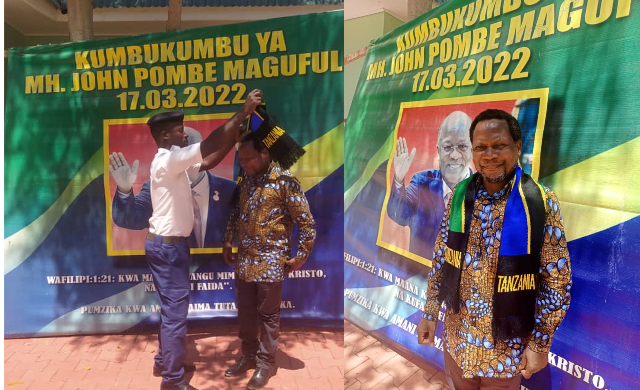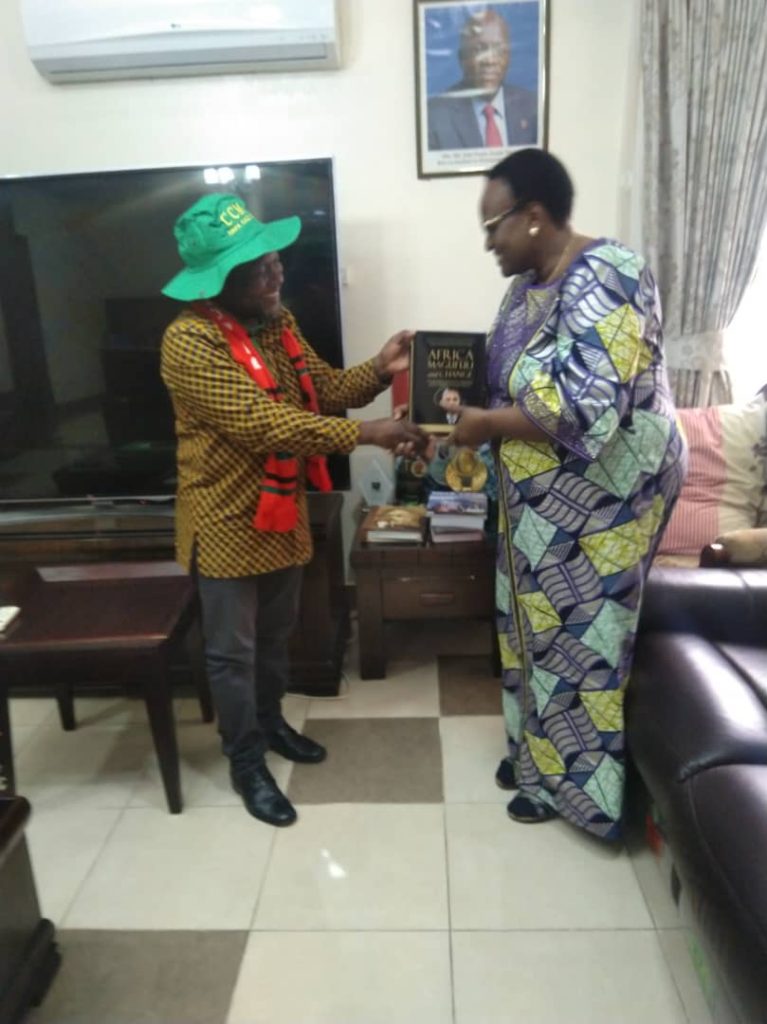
By Jaston Binala.
Prof. Malango Chinthenga from University of Hebron in Lilongwe, Malawi, author of the book on the late President John Pombe Magufuli, says he has been overwhelmed by the brotherly love he has received in Tanzania where he came to launch his book.
Prof. Chinthenga arrived in Mwanza, northern Tanzania, the first week of August, 2023 to launch his book Africa, Magufuli and Change in the book’s home country. The launch at St. Augustine University on August 5 was the first event in a series of two events which would culminate in the launch at Mwalimu Julius Nyerere International Convention Centre in Dar es Salaam August 12.
Describing the cordial welcome he received in Mwanza and later in Dar es Salaam, Prof. Chinthenga told TZBN: “The reception I have received has beaten all my expectations. I wish I could stay here forever. The atmosphere is so friendly. You are more than brothers!”
Over 60 autographed books were sold at the St. Augustine University book launch, he said, adding that the attendance was overwhelming. Janeth Magufuli, wife of the late President was expected to attend the Mwanza launch and to receive a copy of the book. She however did not attend the event but Dr. Ngusa Samike, a Tanzania Government official who had been President Magufuli’s personal assistant represented the Magufuli family and offered an apology on behalf of the former President’s wife.
Dr. Samike then addressed the audience to share his experience on how it felt to work with the Pan-Africanist President. A feature he recalls well was Magufuli’s wish and practice to always wear a badge on his jacket of the African continent.
“All of us his assistants would always wear a badge of the African continent on our jackets,” Dr. Samike said—“although the colors would be different to differentiate between the President and us his assistants”. The former assistant then pinned one of the badges of the African continent on Prof. Chinthenga’s jacket.
The following day, the author of the book “Africa, Magufuli and Change: An Integrated Approach in Abolishing Africa’s Modern Economic Slavery travelled to the burial site of the fallen hero of the African continent at Chato village to pay respects. A Tanzania Government official working at the former President’s mausoleum, identified by only one name as Mr. Lusato, gave Prof. Chinthenga a scarf with the Tanzania flag to commemorate this visit.

In Dar es Salaam–one day before the book launch at Mwalimu Julius Nyerere International Convention Centre–Prof. Chinthenga visited Janeth Magufuli at the family’s Dar es Salaam home, where she narrated her husbands story to the day of his death
“She started crying when she saw me. I was also caught by emotions and ended up joining her shedding tears for the late JPM,” Prof. Chinthenga said. “We then took lunch together.”
The author continued: “I gave Her the Gift of an Autographed Book. I call her the unseen hero behind JPM’ s achievement. She expressed her deepest appreciation for a mere academician to write such a book.”

On her part the former President’s wife presented a number of gifts to Prof. Chinthenga to take back home to Malawi, including a colorful Tanzanian Kitenge cloth .
The book “Africa, Magufuli and Change: An Integrated Approach in Abolishing Africa’s Modern Economic Slavery is an academic feat discussing a serious African topic through the life of a Tanzanian President—which may explain why this book is of interest to academic institutions.

Sabatho Nyamsenda, a lecturer at the Department of Political Science and Public Administration at the University of Dar es Salaam was planned to be one of keynote speakers at the Dar es Salaam launch. The Mwanza launch saw a number of academics speak.
The book reviewer, Prof. David Boston Kamchacha, says the book will help those who are studying development economics as well as development studies in various universities and colleges. It should also help politicians.
Early chapters of the book create the genesis for its later argument that the Late President John Pombe Magufuli is the best example of the kind of leadership Africa needs at this point in time.
“The book…has shown that Africa has the capacity and resources to develop at the same pace, if not faster, than its colonial masters who continually and subtly want to keep Africa as slaves in a modern time,” Dr. Kamchacha says in his forward.



